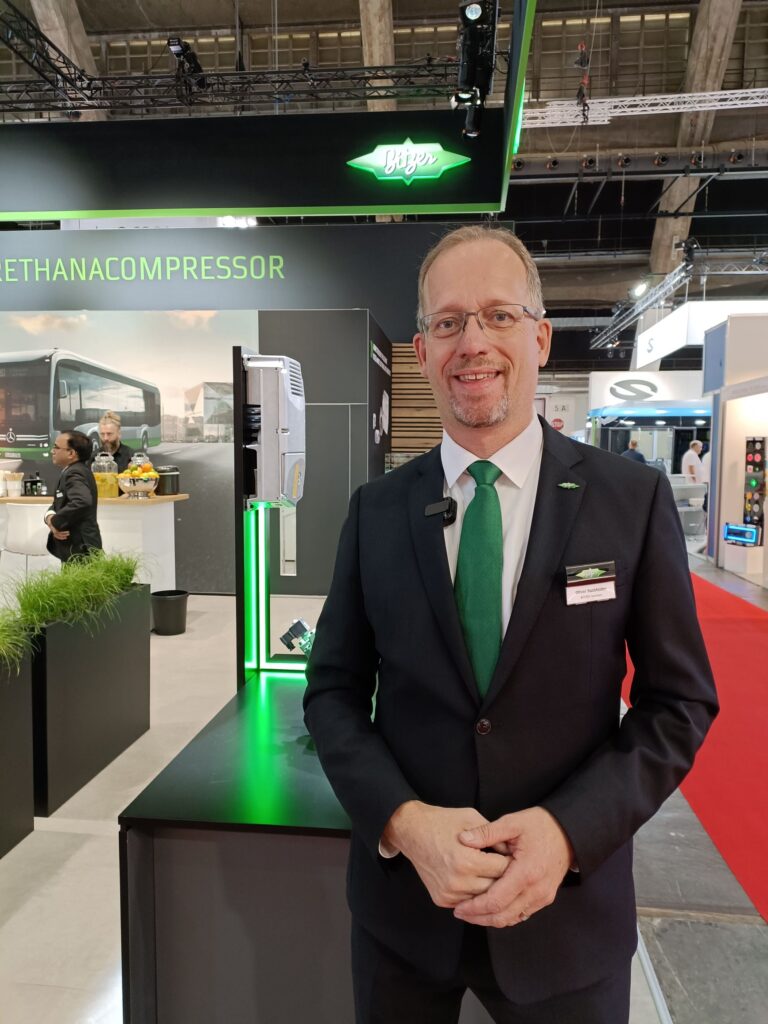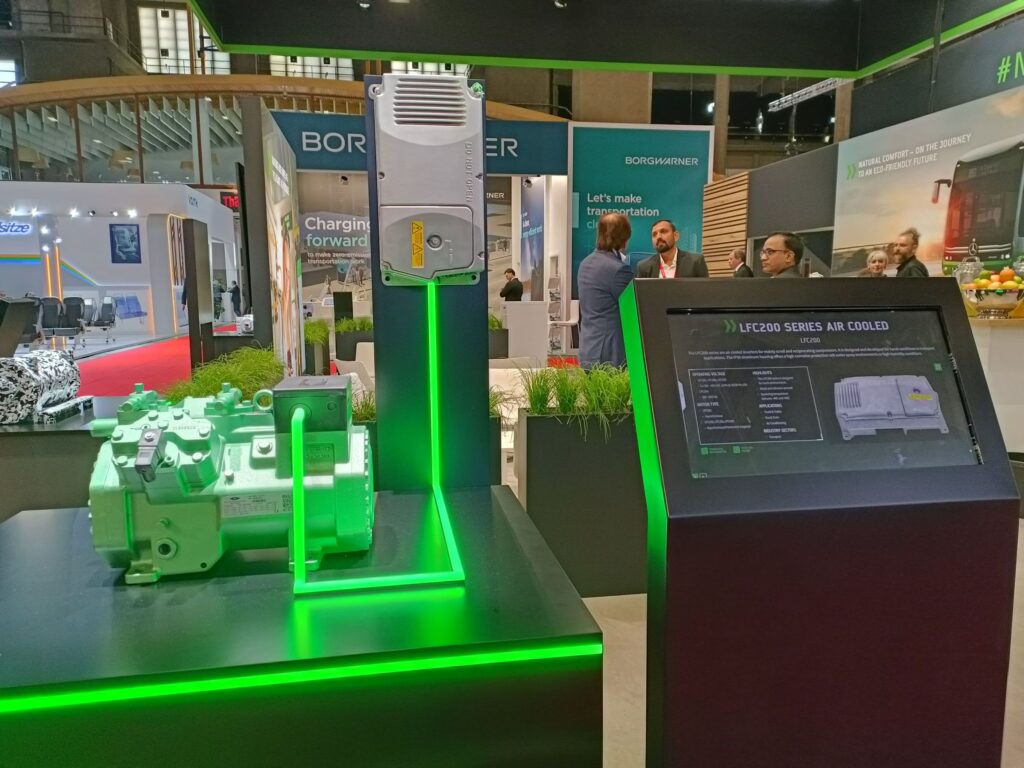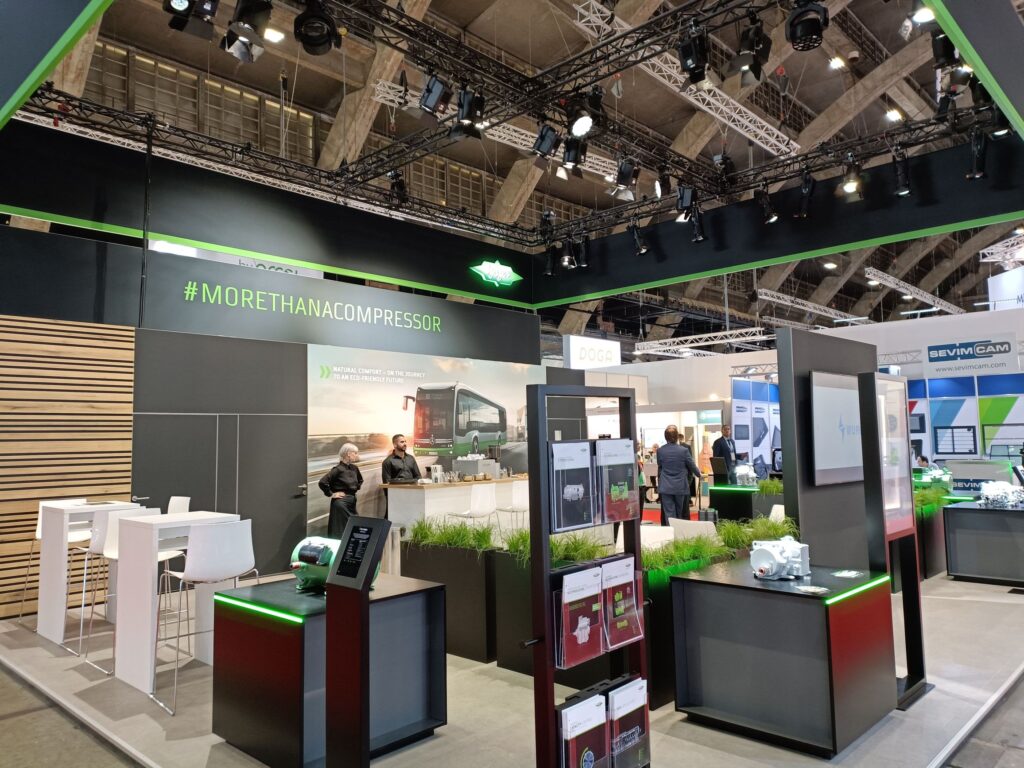
BITZER attended the international trade fair for buses and coaches, Busworld Europe, in Brussels, and at Stand 528 in Hall 5, the specialist in refrigeration, air conditioning and heat pump technologies presented components for energy-efficient, future-proof mobile air conditioning and heat pump systems, including the CO2LITE, its new, compact reciprocating compressor for the natural refrigerant CO2 (R744).
The future of mobility is electric. However, the limited range and long charging times of electric buses continue to pose a challenge, and the associated demands on air conditioning and heat pump systems are correspondingly high: they need to be compact, lightweight, energy-efficient, reliable and future-compatible. In addition, global regulations – in particular, the F-Gas Regulation – and eco-labels like the ‘Blue Angel’ require increasingly eco-friendly solutions, including for the air conditioning and heat pump systems of electric buses. The choice of refrigerants will play a key role in future All that has a direct impact on investment and operating costs.
“An efficient and reliable air conditioning and heat pump system will play a decisive role in increasing the range of electric buses and ensuring a high level of passenger comfort,” says Oliver Rathfelder, Director of Sales Transport at BITZER. “That’s why we at BITZER focus on offering components like our new CO2LITE reciprocating compressor for CO2, which will prepare our customers for current and future challenges.”
BITZER CO2LITE
BITZER presented its CO2LITE reciprocating compressor, which is optimised for transport applications, for the first time at this year’s Busworld. After the SPEEDLITE ELV series for propane (R290), HFO as well as HFC refrigerants, the CO2LITE extends the range to include CO2. Thus, customers can choose from even more low-GWP and natural refrigerants and the matching BITZER compressors.

With its reduced height of 257 mm and a weight of under 80 kg, the CO2LITE supports a space-saving system design and can be used either vertically or horizontally. A wide range of capacity control enables cooling capacities of up to 29 kW and heating capacities of up to 25 kW. After the current pre-series phase, the CO2 reciprocating compressor is scheduled for market launch in 2024.

BITZER’s many years of field experience in handling CO2 as a refrigerant in mobile applications flowed into the development. When it comes to current environmental regulations, CO2 is considered to be a future-proof refrigerant due to its low global warming potential (GWP). The refrigerant performs well in mobile air conditioning and heat pump systems, including in comprehensive thermal management, and enables high efficiency in heat pump operation even at low ambient temperatures.
BITZER SPEEDLITE ELV52 scroll compressors
The SPEEDLITE ELV52, too, is compact and lightweight – was another highlight at the BITZER trade fair stand at Busworld. Thanks to its suction gas cooled permanent magnet motor and wide control range, the low-noise scroll compressor offers high cooling and heating capacities, even with fluctuating operating conditions. A separate speed control adjusts compressor capacity to meet requirements. The optional economiser technology also expands the application limits of the SPEEDLITE ELV52 and accommodates operation even at low ambient temperatures – for stable temperature control inside the vehicle. BITZER goes to great lengths to enable operation with many different low-GWP refrigerants and the natural refrigerant propane (R290), including for the SPEEDLITE ELV52, and thus ensure eco-friendly air conditioning and heat pump systems in vehicles.
Safe investment with natural refrigerants
It is increasingly important to build air conditioning systems and heat pumps with refrigerants that are sure to be available over the long term. At the European level, the F-Gases Regulation 517/2014 is primarily relevant. Since 2015, this regulation regulates the emissions of fluorinated greenhouse gases and bans the use of certain substances based on factors such as their greenhouse effect (GWP) and defines a phase-down of total emissions in carbon dioxide equivalents by 2030. After that, only refrigerants with a greenhouse effect (GWP) close to zero can be used for new systems. The F-Gas Regulation is only applicable in the EU – however, other countries, states and regions are watching closely what’s happening in the EU. Far-reaching environmental regulations such as the Kigali Amendment to the Montreal Protocol stipulate a drastic reduction in emissions even on a global level and have declared the battle on refrigerants with a high global warming potential.